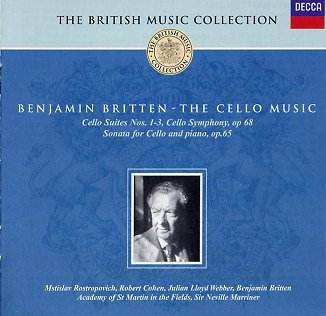The British Music Collection marches on. An excellent
idea this, of Decca’s, to dip into their formidable Britten archive
to pluck out some really significant performances of these five
great cello works. Yes, I do think that this is great music. Original,
brilliantly composed, communicative and highly rewarding to play.
As can be seen from the Opus numbers these works,
from Op.65 to Op.87, appear in the second half of Britten’s career
from 1960 to 1971. They were inspired by a great musician, as
were other of the composer’s works, think of Peter Pears or Julian
Bream. In this case the legend and artist is Mstislav Rostropovich.
It was the latter’s playing of unaccompanied Bach that was the
inspiration behind Britten’s suites.
My initial reaction was of surprise therefore
that ‘Slava’ was not the chief cellist in all of these works,
particularly as I heard first on CD1 his performance of the five
movement Cello Sonata written in 1960. Yet a clue to this may
be an almost throw-away remark written at the end of the booklet
notes by Michael Kennedy concerning the cello suites "since
Britten’s death in 1976, he (Slava) has been unable to steel himself
to play a work that moves him so deeply". So, Rostropovich,
unable to give the first performance of the 3rd Cello
Suite, because the authorities banned him leaving Russia at the
time (1971), never even recorded the music satisfactorily and
probably never will. It was he who pronounced the suites ‘masterpieces’
and the 3rd Suite as "sheer genius".
It may be that the great cellist regarded the
work with such affection because of its references to Shostakovich
whom both men greatly admired. The Suite uses the DSCH motif and
also three Russian folk themes used also by Tchaikovsky, with
whom Russians have a deep affinity, in various arrangements.
Robert Cohen is no mean substitute in the suites
and his 1994 recordings are wonderful and deeply considered. The
booklet has no biographical information but numbered amongst Cohen’s
distinguished teachers is Rostropovich himself. I am quite sure
that the two would have discussed them many a time and this performance
has a real ring of truth about it.
The Cello Sonata was the first of the five works,
which Britten wrote for Rostropovich, and one instantly feels
the authority and wonderful sense of ensemble. This is surely
one of the great Britten performances of the period and its forty-odd
years have not faded it. The recording and its transfer are a
triumph.
The Cello Symphony is, for some people, Britten’s
finest orchestral work and in its concentrated searching and yearning
I can quite see why. It is a true symphony and as such therefore
a unique creation. I also heard in preparing this review the version
by Raphael Wallfisch and the English Chamber Orchestra under Steuart
Bedford (Chandos CHAN 8363). Their performance, at just one minute
shorter, has much to commend it. Each movement has more momentum
and is slightly more intense. The Scherzo is more fleeting. Lloyd
Webber and Marriner linger longer over details and pauses and
give the music more breathing space. A better-recorded balance
is available from this issue which, in a work for cello and orchestra,
is particularly important.
The Scherzo in the Cello Symphony is from the
same stable as the Scherzo-Pizzicato in the sonata, the scherzo
in the 2nd suite and the moto perpetuo in the 1st
and 3rd suites. They are light, ghostly and over before
you have been able to come to terms with them; "weird"
one of my pupils thought. However the suites also show that Britten
was a genius at song writing. Britten realized that the cello
too sings, especially in the hands of a great artist.
The booklet notes are microscopic but as they
are by Michael Kennedy and the composer and are very helpful and
authoritative.
This is music that grows on you. The recordings
are all very good indeed and at mid-price this double album is
truly excellent value. A highly recommendable purchase.
Gary Higginson
